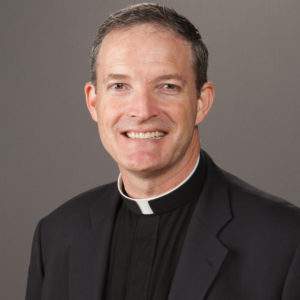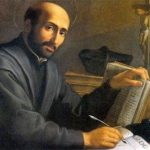Podcast: Play in new window | Download (Duration: 23:35 — 16.3MB) | Embed
Subscribe: Apple Podcasts | Spotify | Amazon Music | Android | Pandora | iHeartRadio | JioSaavn | Podchaser | Gaana | Podcast Index | Email | TuneIn | Deezer | Anghami | RSS | More

Ignatian Prayer – The Heart of the Spiritual Exercises of St. Ignatius of Loyola with Fr. Anthony Wieck S.J.
Fr. Anthony Wieck and Kris McGregor explore the Call of the King meditation in the Spiritual Exercises of St. Ignatius. Asking for grace in prayer should flow from openness rather than self-centered wants. The Ignatian approach begins with presenting one’s heartfelt desires to God, but with a readiness to let Him transform those desires. This requires humility, silence, and listening before speaking. He draws on Mary’s “fiat” as the model attitude, showing how prayer is not about control but about receptivity to God’s will. Fr. Wieck also introduces the forgotten word “depromptitude,” describing it as spiritual pliability—a readiness to move where God leads, like clay in the potter’s hands or a dancer yielding to the lead.
There is also the colloquy, St. Ignatius’ method of intimate dialogue with Christ or a person of the Trinity at the close of prayer. Far from being channeling, it is a simple and personal conversation, shaped by what has been contemplated in scripture. Imagination plays a role by adding “flesh to the skeleton” of the Gospel stories, helping them come alive without changing their core truth. This imaginative engagement is meant to draw the soul beyond itself into God’s life, fostering deeper relational trust and healing. The fruit of Ignatian prayer is not in imagined details but in being drawn more fully into the life of Christ, allowing one’s identity to be found within Him rather than apart from Him.
Discerning Hearts Catholic Reflection Questions:
- How do I bring my desires before God—with open hands, or with an attitude of control?
- In what ways can I cultivate Mary’s “fiat” spirit of surrender in my daily prayer?
- Do I take time to quiet myself and listen before asking for grace?
- Where might God be inviting me to grow in flexibility and readiness, like clay in the potter’s hands?
- How do I experience the colloquy as a personal conversation with Christ or the Trinity?
- What role does imagination play in helping me enter more deeply into the Gospel scenes?
- Am I willing to let God reshape or redirect the desires I bring into prayer?
- How do I recognize the fruits of prayer in my life, especially in being drawn closer into Christ’s life?
Fr. Anthony Wieck is a Jesuit priest of the Central & Southern province. Sixth of nine children, raised on a farm in Oregon, Fr. Anthony began religious life in 1994, spending his first five years of formation in Rome, Italy, studying at the Casa Balthasar and the Gregorian. The former was under the watchful patronage of Pope Benedict XVI (then-Card. Joseph Ratzinger). Fr. Anthony currently acts as retreat master at White House Jesuit Retreat in St. Louis, Missouri. He also offers spiritual direction at the St. Louis diocesan seminary for 25 future priests there.


